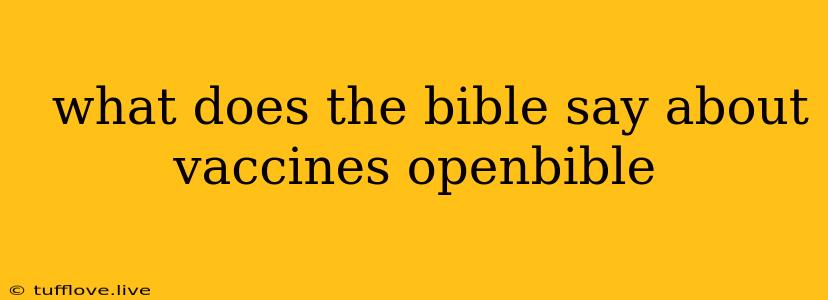The question of whether or not to vaccinate is a deeply personal one, often influenced by a variety of factors including religious beliefs. Some individuals may turn to the Bible for guidance on this complex issue, seeking to understand its teachings on health, bodily autonomy, and the role of faith in decision-making. While the Bible does not explicitly address the modern concept of vaccines, it does contain principles and verses that can offer insight into this discussion.
A Biblical Perspective on Health and Healing
The Bible consistently promotes a holistic approach to health and well-being. It recognizes the interconnectedness of physical, mental, and spiritual health, emphasizing the importance of taking care of our bodies as temples of the Holy Spirit (1 Corinthians 6:19-20). While many verses encourage prayer and faith as a means of healing (James 5:14-15), the Bible also acknowledges the role of medical intervention in addressing physical ailments. For example, the book of Proverbs advises, "Do not despise the discipline of the Lord, and do not resent his rebuke, for the Lord disciplines those he loves, as a father the son he delights in" (Proverbs 3:11-12). This verse suggests that God may use various means, including medical treatments, to bring about healing.
The Role of Personal Responsibility and Wisdom
The Bible also encourages individuals to use wisdom and discernment in their decisions. Proverbs 14:15 states, "The naive believe everything, but the prudent give thought to their steps." This verse emphasizes the importance of careful consideration and research before making significant choices. While faith plays a crucial role in our lives, it does not exempt us from exercising prudence and responsibility in our actions.
Understanding the Concept of "Vaccines" in a Biblical Context
It's crucial to understand that the Bible was written centuries ago, in a time when the understanding of disease and medical practices was vastly different from our own. The concept of vaccines as we know them today did not exist in biblical times. Therefore, directly applying biblical verses to modern medical practices requires careful consideration and interpretation.
Examining Key Biblical Principles
While the Bible doesn't provide specific directives on vaccines, there are several key principles that can inform our approach:
1. Love for Neighbor: The Bible emphasizes the importance of loving our neighbor as ourselves (Matthew 22:39). This principle suggests that we should consider the well-being of others, particularly those who are vulnerable to disease.
2. Stewardship of the Body: As mentioned earlier, the Bible instructs us to view our bodies as temples of the Holy Spirit (1 Corinthians 6:19-20). This implies a responsibility to care for our physical health and to make wise decisions regarding our bodies.
3. Seeking Wisdom: Proverbs 2:6 states, "For the Lord gives wisdom; from his mouth come knowledge and understanding." This verse encourages us to seek God's guidance in all aspects of our lives, including decisions about our health.
The Importance of Informed Decision-Making
Ultimately, the decision of whether or not to vaccinate is a personal one, informed by a complex interplay of factors including personal beliefs, medical advice, and the individual's assessment of risks and benefits. It's essential to approach this decision with prayerful consideration, seeking guidance from trusted sources, and consulting with healthcare professionals to make informed decisions that align with both our faith and our understanding of medical science.
Conclusion
While the Bible doesn't explicitly address vaccines, it offers principles and verses that can guide our approach to health, well-being, and personal responsibility. By examining these principles and engaging in open dialogue with faith leaders and healthcare professionals, individuals can make informed decisions that reflect their personal beliefs and contribute to the well-being of themselves and their communities. The question of whether or not to vaccinate remains a complex and nuanced one, and it's essential to approach this discussion with respect for diverse perspectives and a commitment to seeking truth and wisdom.
